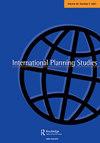酋长们怎么办?回顾南非东开普省前特兰斯凯地区农村土地管理和权属制度的历史变迁和连续性
IF 1.5
Q4 REGIONAL & URBAN PLANNING
引用次数: 2
摘要
至少有1700万南非人生活在“公有”土地上,这些土地由国家托管,由传统领袖保管。然而,传统领导人的土地管理权力是不确定的,从而阻碍了南非农村地区的规划工作和基础设施的提供。本文的目的是通过关注前特兰斯凯地区的“公共”土地所有权,重新审视历代政权期间与农村土地管理和权属制度有关的历史转变和连续性。在这样做的过程中,可以清楚地看到,尽管经过了四分之一个世纪的政策补救,农村地区仍然是殖民主义和种族隔离土地法的受害者。可以说,在传统领导人的土地管理权得到明确答案之前,居民将继续生活在没有市政服务和经济机会的环境中。撒哈拉以南非洲地区也存在类似的现实。从前特兰斯凯地区吸取的教训可能会适用于其他地区,尽管它们处于不同的位置。本文章由计算机程序翻译,如有差异,请以英文原文为准。
What to do with the chiefs? Revisiting the historical shifts and continuities of rural land administration and tenure systems in the former Transkei of the Eastern Cape, South Africa
ABSTRACT At least seventeen million South Africans live on ‘communal’ landholdings that are held in trust by the state under the custodianship of traditional leaders. Yet, traditional leaders’ land administration powers are undetermined, thereby impeding planning efforts and infrastructure provisions in South Africa’s rural regions. The aim of this article is to revisit the historical shifts and continuities pertaining to rural land administration and tenure systems during successive regimes by focusing on ‘communal’ landholdings in the former Transkei. In so doing it becomes clear how rural regions remain victims of colonial and apartheid land laws despite a quarter of a century of policy redress. Arguably, until decisive answers are established regarding traditional leaders’ land administration powers, residents will continue to live without municipal services and economic opportunities. Similar realities are also found across sub-Saharan Africa. Lessons from the former Transkei might then be relevant elsewhere despite situated differences.
求助全文
通过发布文献求助,成功后即可免费获取论文全文。
去求助
来源期刊

International Planning Studies
REGIONAL & URBAN PLANNING-
CiteScore
4.60
自引率
4.80%
发文量
20
期刊介绍:
Planning, at urban, regional, national and international levels, faces new challenges, notably those related to the growth of globalisation as both an objective socio-economic process and a shift in policy-maker perceptions and modes of analysis. International Planning Studies (IPS) addresses these issues by publishing quality research in a variety of specific fields and from a range of theoretical and normative perspectives, which helps improve understanding of the actual and potential role of planning and planners in this context.
 求助内容:
求助内容: 应助结果提醒方式:
应助结果提醒方式:


